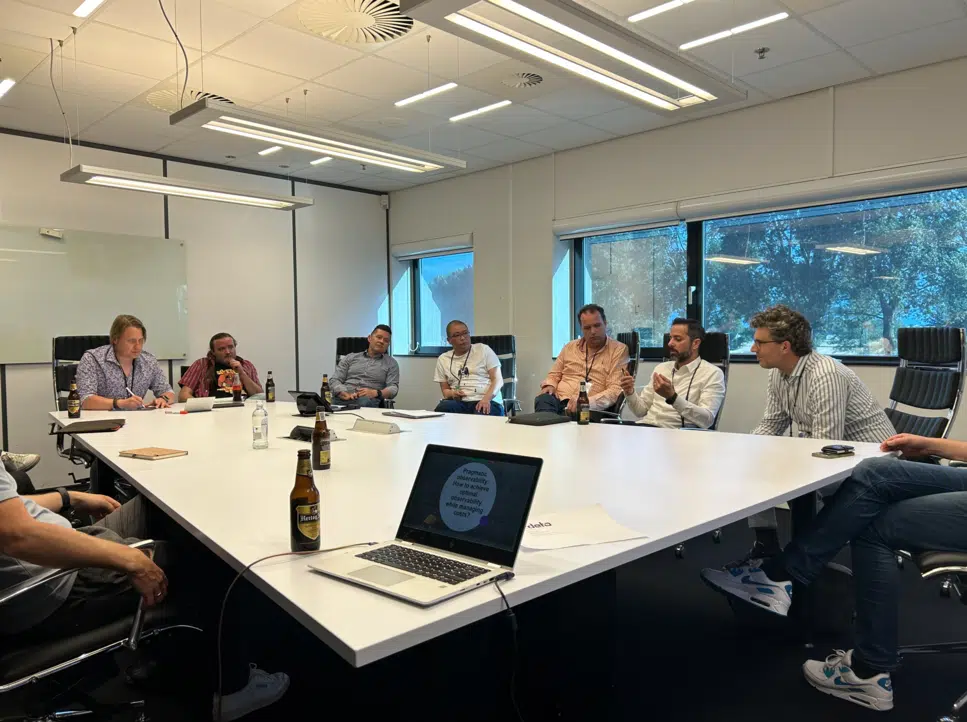In our most recent #TalentQA interview we spoke with Ben Murphy-Ryan, Senior Director – Talent Acquisition at Arm, a British multinational semiconductor and software design company.
Ben spoke to us about the work Arm does, the challenges they face hiring technical talent on a global scale, and the strategies they use to source and engage technical talent. He also discusses the changes and emerging trends in the recruitment/talent acquisition industry and the skills that are crucial to being a successful recruiter in today’s digital age.
Third Republic (TR): You’ve been working in Talent Acquisition for some time, could you tell us about your journey and the changes you have seen throughout the years?
Ben Murphy-Ryan (BMR): I’ve been working in recruiting and talent acquisition now for 16 years overall, and pretty much all of that has been in-house. There’s been quite a bit of commonality in my experience, I started out in e-commerce and retail, working with Selfridges through to online at Amazon, particularly during their quite early growth stage in the UK.
I then moved on to technology recruitment, which I’ve now been in for around the last 8 to 9 years or so. The commonality here has been around high-paced, growth organisations, with a really strong focus on candidate experience but also organisations going through change and transformation. The growth and transformation is something I really enjoy and something that has carried on here in my time at Arm.
Regarding the change piece – throughout my time in the industry, I have definitely seen a transformation in candidate engagement methodologies. We’ve gone from online and direct applications on job boards, moving through to the use of LinkedIn, social engagement, direct sourcing and recruiting in-house, with a rise in demand for candidate outreach skills that you see in agencies. Moving on to today, which is a real blended mix of driving multi-channel campaign activity that covers all those areas, which has really revolutionised the sourcing industry.
TR: You are now the Senior Director of Global Talent Acquisition at Arm, could you explain a bit about the innovative work that Arm does?
BMR: The heritage and background of Arm is that it’s a semiconductor design company, so essentially we design the chips that power technology in lots of different places. The user piece is that compared to businesses like Intel, who have a consumer base, we are solely a B2B partner-based model. We design the chip architecture and we licence that to other technology organisations and third parties. So, 95% of the world’s smartphones have Arm’s powered chips inside them.
We’re coming up to our 30th year in operation next year. We have definitely scaled over that time, and been really successful in driving forward the agenda for technology change. Manifested in this is our philosophy of connecting populations – so, really looking into the future of the Wild West of IoT, embedded smart devices and the management of those devices.
TR: What challenges, if any, have you experienced when recruiting talent at Arm?
BMR: I don’t think the challenges that we are experiencing are necessarily exclusive to Arm, it’s more about the economy, environment and industry that we operate in. We hire globally, whilst we have broken the UK, we also have teams in the US, Canada, India and Asia Pacific too.
We hire for a range of skillsets – from hardware and design, migrating towards software engineering – the roles we recruit for are very broad across tech and they are without a doubt in demand, particularly when you start looking at roles in the data space.
In the US candidates can choose between, Google, Apple, Facebook and Amazon, so being able to engage with candidates and having a great value proposition that resonates with people is really important, and that’s the approach we take.
We have a slightly different look and feel to the organisation in comparison to other tech companies experiencing the same growth and scale. People are our number one commodity at Arm, they really are our key asset, which means we take our core beliefs, values and work-life balance really seriously and this does set us apart from the environments at larger tech companies.
The other part of this is the global side of things. With global mobility, we are seeing a lot of people moving between regions – from India and China to the UK and the US. So, we actually search for talent globally, bringing talent into the UK, as well as hiring within the UK market, and that’s the same around the world. The global nature of the tech talent market, is the same for us as it is for tech organisations all over the world, it’s really challenging but it’s also an opportunity for us to create the right opportunities for these people to join us.
TR: What sort of strategies do you adopt in terms of attracting, engaging and securing technical talent at Arm?
BMR: In line with the other tech organisations, our primary method for sourcing is leveraging networks and connections our own people have. So, referrals are a big part of our hiring strategy and approach at Arm. We have a decent rate of hires through company referrals because we find that great people, tend to know great people. Being able to tap into that and harness those relationships is really important. Employee referrals are our biggest source of hire globally.
At the same time, we are looking at how we can, as recruiters, work with our Hiring Managers and help them to dig into their networks. We’re also doing some work around Hiring Managers as Recruiters, so actually working with them and giving them the tools, capabilities and support to go out and source people directly. Being able to talk directly to a candidate who probably gets hundreds of messages a day from recruiters, but doesn’t get hiring managers reach out very often – we find is a really interesting way of opening up the conversation and getting people interested. It really helps open the doors.
Once we have engaged a candidate, we try to get them meeting with a broad range of people to help them understand what their peer group will look like. It’s also really important for us to remain in contact with the candidates, as well as speed being really important. We try and keep the number of interviews down as much as possible, while still ensuring that the candidate understands Arm and what we stand for.
TR: Have you recognised a skills gap, specifically in technical talent during your time in the industry?
BMR: There’s really a geographical element to this, there are various skills shortages in different areas and countries. The need is actually for us to think more into the backgrounds people come from and their suitability to the role. Software engineering can be a challenging one to recruit into simply because of the sheet competition that exists in that area.
Overall, I wouldn’t say there is one area that is particularly challenging, they all have their challenges depending on the locations.
TR: Do you think that this shortage of skills is driving a recent change in candidate behaviours?
BMR: Absolutely, I think candidates behaviours have in some ways been altered by the behaviours in the recruiting industry. I’ve heard horror stories of some technical candidates being contacted 8 – 10 times a day. It becomes a noise issue. The candidate behaviour isn’t that they aren’t interested, it’s that they’re trying to do some really interesting work, but it’s almost like there is a constant distraction coming from recruiters as a community.
We focus more on trying to help people understand what Arm is about. We do see quite a high volume of direct traffic coming through us because we do have quite a strong brand presence in the market. In some ways, I haven’t seen candidate behaviours change too much, because they are still applying for jobs, however, we find that there are many people being contacted around potential opportunities. It’s about being able to differentiate yourself from that noise.
It can be damaging from a reputation perspective for companies if a candidate tells them that they’re the 15th call they’ve had this week about opportunities. So, as a sector, we really need to think about how we can really help to manage that expectation better. Ultimately, over time it’s definitely been getting worse and is putting people off.
TR: How should businesses react to the changes in candidate behaviours?
BMR: I think it’s definitely about getting candidates in contact with the hiring community faster. The idea should be to have hiring managers being the first touchpoint in the organisations. The initial engagement is largely better placed with the hiring manager community. Of course, it’s really about the capabilities of the hiring managers as well and making sure that you have people who are good at engaging with candidates.
I think particularly in organisations where they haven’t maybe hired a lot, people think that if somebody wants a job they are going to come to me. That just isn’t how the market works anymore. So, we also have to manage our own expectations as well and recognise that it is actually a candidate-driven market. Whilst we want people to be passionate about Arm and what we do, we need to take them on a journey to build that passion, particularly if they are a passive candidate in the first place.
TR: Would you say that being a recruiter in today’s day and age requires more advanced relationship and people management skills?
BMR: Absolutely, from both sides actually – in regard to candidate engagement, definitely. Coming from a stakeholder, hiring manager engagement within an organisation is actually really important. Our recruiter roles at Arm have a strong degree of relationship management, business partnering capabilities in them, because we’ve recognised that we need to guide and support the hiring managers through their recruiting journey with us – the relationship management piece is really important.
So actually, I think it’s become not just a recruiter role, which is based around sourcing and engaging talent. It’s become much more of a holistic role, about managing the overall end-to-end experience for candidates, as well as hiring managers and recognising that they are two different things, that may require different skill sets.
TR: What other emerging trends are you seeing in the talent acquisition/recruitment industry?
BMR: It’s something that’s been around for a while, but I think that brand and being authentic around that is still really important. Tech is definitely an interesting trend. We’ve seen an interesting trend in the rise of peer to peer-reviewing sites, like Glassdoor. Which can mean that companies are faced with negative comments about the internal processes and environment of their business. But the idea should be to embrace these platforms and engage with the comments.
I think that many companies and recruiters are struggling to get the tone right in terms of engagement, and doing it in a way that feels humble and authentic. It’s all about treading that balance.
Our candidates do reference these platforms, they talk about it and they talk about the interview process. So, it goes back to managing expectation, we have to prepare our hiring managers to understand that they might be asked about specific reviews that people have seen online. It adds an interesting dynamic to the process, and the key advice we offer is to always be honest and transparent.
TR: We live in an increasingly digital world; how can recruiters keep up to date with the ever-evolving technology and techniques in the industry?
BMR: This is an interesting question. Bots and AI are still in the really early stages of development and I think the speed of advancement of these can sometimes be overplayed.
Saying that I think with the advancements in technology, it’s important for recruiters to be savvy and use these new technologies as an enabler when it comes to sourcing and engaging top talent.
While technology will definitely enable recruiters and talent teams to do their jobs more effectively, I don’t think it will ever replace recruitment.
If you’d like to take part in our #TalentQA series or you’re looking to source technical talent, get in touch with our specialist teams today!





